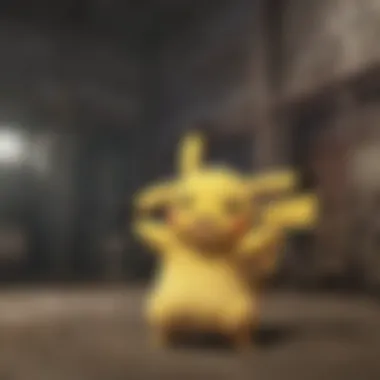Understanding Voice Acting in Pokémon Video Games


Intro
Voice acting in Pokémon games adds a vital layer to the gaming experience. Through voice calls, the characters come alive, leading to a deeper connection with players. This leads to player immersion, which enhances gameplay. Understanding how these voice acting calls work is crucial to appreciating the storytelling in Pokémon games.
Pokemon Game Overview
History of Pokemon games
The Pokémon franchise started in 1996 with Pokémon Red and Green, introduced by Nintendo and Game Freak. This marked the beginning of a cultural phenomenon. The series focused on capturing, training, and battling creatures known as Pokémon. Over the years, many generations and variations emerged.
Evolution of gameplay mechanics
Initially, gameplay mechanics were simple. As technology advanced, so did the complexity of these games. Features such as graphics, player vs. player battles, and immersive storylines became more elaborate. The introduction of voice acting aligns with this trajectory, enhancing player engagement by providing a richer narrative.
Prologue to different game versions
Various iterations of Pokémon games exist, from console titles like Pokémon Sword and Shield to mobile entries such as Pokémon GO. Each version offers unique gameplay experiences, contributing their own spin to how players interact with the Pokémon universe. The voice acting aspect varies from game to game, influencing character depth and commanding attention.
Significance of Voice Acting
Voice acting is integral in games like Pokémon. It adds life to characters and creates emotional connections. Notable characters like Pikachu have become iconic partly due to their distinctive voices. Additionally, the differences in voice calls across games serve to enhance the theme and atmosphere of the narrative.
Role of Voice Acting in Character Development
Through voice acting, developers convey personality traits and emotional cues. For example, Ash’s passionate and adventurous spirit is reflected in the animated series and video games. Actors infuse characters with depth, making them more relatable and memorable to players.
Impact on Player Immersion
As voice acting continues to evolve, it shapes player immersion significantly. Familiar sounds draw players into the Pokémon world further. For instance, renowned Pokémon like Charizard have their own recognizable calls, forging a sense of belonging in the game universe. Players are more likely to remember characters when their voices resonate.
The Audition Process
Conducting voice acting calls involves detailed criteria. Reputable studios typically look for voices that fit the personality of the characters. The audition process often includes several stages, from reading lines to capturing emotion for key scenes.
Essential Skills for Aspiring Voice Actors
Aspiring voice actors must develop certain skills:
- Vocal range: Having a flexible voice allows for varied character portrayal.
- Acting ability: Basic acting techniques assist in embodying diverse roles.
- Diction and clarity: It's crucial to articulate words clearly for the characters' impact to resonate.
Career Opportunities in Voice Acting
For those considering a path in voice acting, Pokémon games often serve as entry points. While competitive, opportunities exist. Networking in the gaming community and continuously honing one’s craft is essential to breaking into the industry. Avocations include auditions for animation, gaming, and commercials.
The impact of voice acting in gaming extends beyond mere sounds; it fundamentally shapes player experiences and narratives. Whether one is navigating the storylines of Pokémon or exploring new worlds in other titles, quality voice work elevates engagement.
The End
Voice acting calls within the context of Pokémon games represent a fusion of valuable art and compelling gameplay. Understanding their processes amplifies appreciation for character depth. For both dedicated fans and prospective actors, this exploration has unveiled essential aspects of this niche yet significant discipline. The marriage of voice and gameplay becomes paramount while evolving the lifelong relationship individuals hold with these beloved creatures.
Prelude to Voice Acting in Gaming
Voice acting plays a critical role in the modern gaming landscape. It is not simply about providing voices for characters; it is about conveying emotion, depth, and personality. Games today rely heavily on voice acting to enrich storytelling. Player engagement and immersion increase with good voice performances. This connection between the voice actors and players forms an important part of gaming experience. In this article, we will explore how voice acting operates within Pokémon games in particular.
Importance of Voice Acting in Video Games


Voice acting adds another layer to video game narratives. Many gamers can recall moments from their favorite games that are made memorable by the performance of voice actors. For example, dialogue delivery can influence how players perceive characters—whether relatable, villainous, or humorous.
Some benefits include:
- Character Development: Strong voice acting provides attributes to characters, making them more realistic and relatable.
- Emotional Connection: Listening to voice performances helps players feel closer to characters. This depth makes invested in the narrative.
- Immersion: Great narrative voice work leads players deeper into the world of the game, enhancing their overall experience.
Overall, as games advance technologically, voice acting has become an essential component in appealing to diverse audiences.
Role of Voice Acting in Pokémon Games
In the Pokémon series, voice acting is vital. Players have spent years forming bonds with characters in the series. The voice actors help flesh out these iconic figures. Games like Pokémon Sword and Shield utilize voice acting to imbue the characters with personalities and unique voice traits. With subtitles available, players can choose to focus more on vocal delivery, lending both accessibility and interactivity. This covers a large age demographic.
Additionally, voice acting in Pokémon promotes cohesion in storytelling. Since the world of Pokémon features various characters and dialects, distinct voice acting enriches the experience.
Pokémon games benefit significantly from voice acting, adding emotional weight and context to characters.
Good voice actors draw from a wide emotional range, which can influence how players perceive the dynamics at play in various interactions. The overall impact builds toward a compelling call-to-action always resonating in gemstone discussions among fans.
In summary, voice acting significantly affects character presentation and serves as a bridge between the players and the game narrative. As newer Pokémon iterations embody fresh characters and narratives, voice acting will continue to play an essential role.
Understanding Voice Acting Calls
Understanding the intricacies of voice acting calls is vital for grasping their significance within the Pokémon gaming universe. Voice acting infuses these beloved characters with authenticity, allowing players to connect emotionally with Pokémon and their trainers. As gamers are confronted with visually stunning gameplay, the alignment of audio with visuals becomes paramount. Players can engage more deeply when they resonate with what they hear just as much as with what they see. Over time, Pokémon has evolved, and this development includes its sound design and voice work.
Moreover, examining voice acting calls presents an opportunity to appreciate character depth. As voice actors bring their own interpretations to characters, these interpretations can influence player perceptions. This is especially relevant in a franchise where character personalities and backgrounds are richly developed.
Defining Voice Acting Calls
Voice acting calls refer to the process by which casting directors and game developers seek out voices to portray the characters in a game. This involves putting out a 'call' for actors to audition for specific roles. These calls can include opportunities for both seasoned actors and newcomers. They help to gather a pool of talent that can bring various characters to life. Notably, each casting call has unique directives about the character portrayal, tone, and style expected in the recordings. By understanding and standardizing these elements, producers can better select suitable candidates for the given roles.
Process of Conducting Voice Acting Calls
Preparation and Casting
Preparation and casting are crucial stages in conducting effective voice acting calls. This phase assesses exactly how a character should sound. Designers take into account countless factors, such as age, background, emotional depth, and personality traits. The characteristic of thorough preparation ensures that the casting process aligns closely with the overall vision of the game. It fosters a clear understanding of what is required from actors, increasing the quality of the final product. However, without careful thought before selection, there can be mismatched expectations – meaning characters might not project the intended persona.
Audition Process
The audition process is a fundamental part of voice acting calls. This stage allows clear visibility into the talent pool regarding their abilities and styles. Most auditions may include reading specific lines or improvisational work. This key element encourages flexibility and breadth of performance, showcasing each actor’s versatility in character portrayal. One advantage of this method is the opportunity for talents to shine through even for non-main characters. Yet, auditions can also consume significant resources and time, effecting slow progress in production schedules.
Selection Criteria
Selection criteria outline the requirements and standards for scripts and voices in calls. This involves preferences for tone, pitch, and articulation, including gender or personality types of characters. Understanding clear selection criteria is persistingly critical for producers. It helps streamline the decision-making process, enhancing efficiency. When all participants understand dimensional aspects they exhibit, decision points improve drastically. However, stringent selection may inadvertently reduce diversity in casting, oft ignoring emerging talent or innovative portrayals.
Criteria for Voice Acting Calls in Pokémon
Understanding the criteria for voice acting calls in Pokémon games is essential for both students and professionals in the voice acting scene. This framework encompasses key factors that determine not only the actors' ability to portray characters effectively but also the game's overall storytelling quality. By diving into specific requirements, those involved can ensure that every performance aligns closely with the developers' vision, resulting in experience and immersion for the players.
Character Profiles and Requirements
In voice acting for Pokémon, every character in the game comes with a unique profile. This profile includes various elements, such as backstory and personality traits. Clarity on these requirements is imperative for casting decisions. Each profile should give detailed insights into:
- Personality: Characters may embody traits like bravery, caution, or mischief, influencing the actor's vocal choices.
- Background: A character’s past influences their motivations, shaping how lines are delivered.
- Peculiarities: Certain characters might have unique mannerisms or speech patterns, which actors must replicate for authenticity.
Actors need to consider these aspects to truly capture the essence of the Pokémon universe. Recognizing the behavioral archetypes set forth by these profiles allows for nuanced portrayals that can elevate the script.
Voice Suitability and Matching


Once the character profiles are established, matching the correct voice pitch, tone, and style to the character is crucial. Voice suitability ensures that the auditory representation aligns seamlessly with viewers’ expectations. The following factors play a significant role in this process:
- Tone Adaptation: Different characters require varying levels of intensity, from gentle tones for soothing characters to sharp, powerful voices for antagonists.
- Vocal Range: A well-rounded actor must possess a versatile vocal range that can adjust with ease from an innocent childlike tone to a deep, authoritative voice or even scary growls.
- Emotional Resonance: Dynamics help convey a spectrum of feelings while ensuring that they resonate with the audience.
Selecting voices that align with character appropriateness gives clear signals to players regarding personality and motivations. This interaction ultimately contributes to personalized and immersive gaming experiences, where players bond with their digital companions.
"The voice an actor brings to their character can alter perceptions and emotional responses, solidifying relationships within the game."
By focusing on these criteria, game developers can fulfill their aim to captivate players through rich storytelling and profound character experiences.
Impact of Voice Acting on Gameplay Experience
Voice acting significantly shapes the gameplay experience in Pokémon games. This element adds a layer of storytelling that is crucial for players. Characters come alive through voice, making their emotions and intentions more clear. The spoken dialogue allows for a more engaging interaction, reinforcing the connection between players and the game universe. Through voice acting, players can feel the triumphs and struggles of their favorite characters.
Enhancing Character Depth
Voice acting serves a primary role in enhancing character depth in Pokémon. Each Pokémon or human character showcases unique traits and narratives that a lifeless text cannot convey. Integrating voice talent helps articulate personality, motives, and emotional states. For example, when a character expresses surprise or sadness, skilled voice actors can portray these feelings more effectively. This resonance encourages players to build attachments with characters, yielding a richer experience.
With every dialogue exchange, voice acting adds emotional nuance to gameplay. Players may find that these voice interactions breathe life into static artwork and character designs. The differences in tones and inflections by various voice actors can also represent the varied personalities of characters. By layering distinct vocalizations with game visualization, the character becomes multidimensional.
- Characters with stronger, memorable voices can lead to increased audience investment.
- Characters such as Mimikyu or Team Rocket's Jessie and James often becom eme iconically entrenched in gamer culture partly due to their unique and distinctive voice profiles.
By developing characters with depth, the gameplay reaches an emotional apex that enhances player enjoyment. The mechanics merge seamlessly with the narrative component through carefully crafted voice work.
Influencing Player Immersion
Voice acting holds substantial power in influencing player immersion within Pokémon games. When players hear a character's voice, it generates an immediate connection. This authentic soundscape becomes crucial as players explore Pokémon territories, fostering a more immersive journey.
This full immersion is achieved in several ways:
- Engagement: Players are likelier to engage with land, environments, and character storylines because the voice implements a layer of reality.
- Atmosphere Creation: Quality voice acting enhances the overall gaming environment. Different locations or scenarios are complemented with specific tonal qualities to match the mood.
- Sympathetic Alignment: Dynamic performances help to evoke empathy toward characters. An emotionally resonant delivery enables players to relate to adversity, forming bonds as connections are established.
A well-executed voice line has the power to deeply alter a moment within gameplay, swapping monotony for memorable experiences. As players dive into complex narratives supported by voice, they find themselves pas sively participating in the unfolding stories of their beloved Pokémon universe. The layer of vocal interpretation affirms the emotional stakes, merging the player's experiences with rich sound exploration that will long resonate.
“Voice acting brings emotion, fate, and individuality to the various factions within Pokémon.”
The systematic approach to integrating voice acting affirms its positive linkage to player investment. As backward analyzes suggested, higher emotional investment usually correlates with loyalty and long-term engagement among Pokémon players.
Emerging Trends in Voice Acting for Games
The realm of voice acting is evolving, particularly within video games. These emerging trends are shaping how games like Pokémon are developed, allowing for innovation and greater connection between players and characters. Understanding these trends enhances the appreciation of voice acting roles and lays out a landscape of opportunities for aspiring voice actors.
Integration of AI Voices
One of the most significant trends is the integration of AI voices in gaming. With advancements in technology, artificial intelligence is being used to generate voice lines, providing a cost-effective solution for game developers.
Benefits of AI voices include:
- Rapid production: AI allows for quick generation of voice samples, which reduces overall development time.
- On-demand content creation: AI systems can create voice lines tailored for various game scenarios.
- Versatility: AI voices can be easily modified in terms of pitch, tone, and style.
However, there are considerations regarding audience perception and authenticity. Players often seek genuine emotional connection with characters. While AI can mimic some vocal aspects, it may lack the depth that actual human actors provide.
Growth of Indie Game Voice Acting
The indie game sector is thriving and is pushing forward new opportunities for voice actors. Unlike major studios, indie developers often have limited budgets. They explore creativity in casting and production, utilizing talent that might not be found in mainstream circles. This trend fosters a unique environment for growth.


Elements of this growth include:
- Diverse roles: Indie projects often provide opportunities for voice actors to play unconventional characters.
- Community engagement: Many indie games involve their communities, seeking enthusiastic voice talents from their fanbase.
- Portfolio building: Indie games allow emerging voice actors to showcase their skills and gain experience.
As indie game voice acting gains momentum, so too does the importance of innovation and flexibility. Actors willing to experiment and adapt will find distinctive opportunities as these games become more popular.
The landscape of voice acting in video games continues to adapt, presenting novel avenues for aspiring talent to explore within both large franchises like Pokémon and within indie realms.
Exploring Opportunities in Voice Acting
Voice acting provides diverse avenues for individuals passionate about performance and the gaming industry. As Pokémon games continue to expand their narratives and character depth, the necessity for skilled voice actors becomes increasingly significant. This importance reflects the evolving nature of storytelling in video games. Understanding the routes toward a voice acting career can equip potential talents with the insight needed to enter this competitive field.
Paths to Becoming a Voice Actor
The journey towards becoming a voice actor can take many forms. Key steps include:
- Training: Professionals often gain experience through acting classes, workshops, and practical sessions.
- Building a Portfolio: An essential aspect of breaking into the industry includes compiling a collection of voice samples and auditions.
- Networking: Engaging with other actors, producers, and industry influences can open pathways.
A mixture of formal training and hands-on experience often yield the best results. Some voice actors focus solely on video games, while others diversify across various media, including animation, commercials, and audiobooks.
Skills Required for Voice Acting
Vocal Techniques
Vocal techniques are foundational for any voice actor. These techniques can include various aspects such as:
- Range: A good voice actor is often capable of hitting a wide range of pitches.
- Diction: Clear pronunciation enhances character authenticity.
- Pitch Control: Adjusting one’s voice for different characters is essential.
A strong command of vocal techniques is a crucial element discussed in this article, providing a toolset necessary for actors aiming to portray various characters effectively. Practice thoroughly aids with developing these proficiencies, enabling voice actors to tackle diverse scripts with confidence.
Acting Skills
Acting skills are equally essential in voice acting. Key characteristics include:
- Emotional Reach: The ability to convey various emotions distinctly through voice.
- Character Interpretation: Understanding a character’s background can significantly inform delivery.
The nature of this skillset cannot be overstated. Voice actors who harness powerful acting skills often outperform their peers. Yet, the inherent challenge lies in creating a visual-free performance that strongly resonates with the audience. Special training in acting can serve voice actors well.
Audio Recording Proficiency
Audio recording proficiency has gained increasing importance. The ability to understand and utilize equipment benefits projects substantially. Highlights include:
- Familiarity with Software: Knowing programs for sound editing can streamline work.
- Quality Control: Ensuring high-quality recordings aligns with professional standards.
This aspect is crucial for modern voice actors, particularly in an age where many perform from studio settings or home. The potential advantage in having proficient audio skills enables faster turnaround times on projects. While it may require separate training, mastering audio capabilities aids in producing industry-ready samples effectively.
Overall, exploring opportunities in voice acting comprehensively involves understanding personal skills, procedural pathways, and the demands of the industry, particularly regarding beloved franchises like Pokémon.
Culmination
The discussion around voice acting calls in Pokémon games cannot be understated. They serve as a foundation for the overall experience players have with the game. Voice acting adds a layer of depth to character development and fosters immersion in the Pokémon world. This article highlighted the selection process, criteria, and the overall impact voice acting has on gameplay.
Recap of Voice Acting Calls in Pokémon
Voice acting calls significantly shape how characters resonate with the audience. These calls are done with precision to ensure performers are well-suited to their roles. It is not merely about having a good voice; fitting the character's essence is vital. Various stages are in place, from auditioning to casting decisions based on vocal qualities and performance abilities. Voices not only narrate a character’s dialogue but also convey emotions, motivations, and even the essence of the Pok�émon themselves. The intertwining of voice, characteristics, and storyline ultimately enhances player engagement, making each battle or interaction more captivating.
Final Thoughts on Voice Work in Gaming
In a broader sense, voice work in gaming, especially in the pungent realm of Pokémon, showcases the amazing convergence of art and technology. As games evolve, so do the demands on voice actors, who are required to exhibit versatility and emotional range. The importance of voice acting in Pokémon transcends just personality portrayal; it lays foundations for social interactions within the games. As gamers continue to evolve, so will the provision of clearer paths for voice actors entering the industry. These opportunities contribute not only to individual growth but to raising the bar for voice communication in games overall.
Voice acting is not just a job; it is an art form that breathes life into the characters players love the most.
In summation, as the landscape of gaming shifts and grows, the avenues for aspiring voice actors widen. For Pokémon enthusiasts, understanding this voice acting process enhances appreciation for these characters and stories that define their favorite games.







